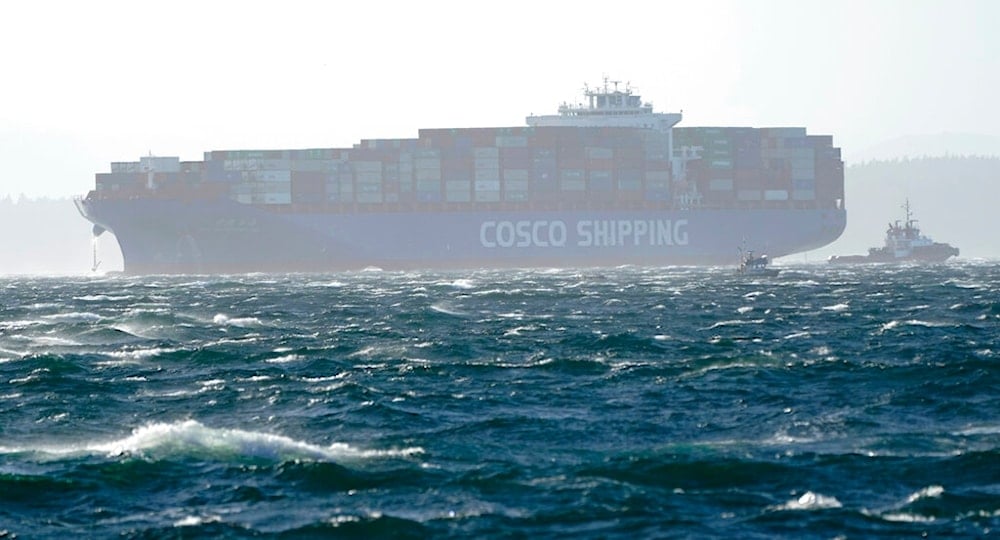Biden, Sunak re-election, economic recovery hindered by Red Sea crisis
There is now growing concern in government circles in London and Washington that Sunak and Biden's adventure in the Red Sea could hinder their re-election and any prospects for economic recovery.
-

A Cosco Shipping cargo container boat shown with its anchor out on rough seas in Elliott Bay, Tuesday, Oct. 13, 2020, in Seattle (AP)
As UK Prime Minister Rishi Sunak and US President Joe Biden strive for re-election, there's a mounting concern in government circles in London and Washington that events in the Middle East, especially following the US-UK-led aggression on Yemen, could jeopardize the initially optimistic outlook for economic recovery, reported The Guardian.
Reciprocally, failure to positively impact the economy or taking actions that consequently have negative repercussions on the economy may impact their chances at the ballot box.
According to The Guardian, economists have cautioned that a protracted conflict in the Red Sea and increasing tensions across the Middle East could lead to severe repercussions on the global economy, emphasizing a potential resurgence of inflation, as well as disruptions in energy supplies.
As Rishi Sunak prepares to address the House of Commons on Monday regarding UK and US airstrikes on Yemen, concerns arise about the prolonged conflict in the Middle East. Sunak is expected to face questions from MPs, while President Biden encounters opposition from progressives in his party, particularly against US military support for Israeli actions in Gaza.
For example, Congressman Ro Khanna emphasizes the need for congressional approval before engaging in another Middle East conflict, saying, "The president needs to come to Congress before launching a strike against the Houthis in Yemen and involving us in another Middle East conflict."
World Bank and the economy
In turn, the World Bank, in its most recent report on global economic prospects, also emphasized that "conflict escalation could lead to surging energy prices, with broader implications for global activity and inflation," adding that "recent attacks on commercial vessels transiting the Red Sea have already started to disrupt key shipping routes, eroding slack in supply networks and increasing the likelihood of inflationary bottlenecks."
Moreover, the report explained that "in a setting of escalating conflicts, energy supplies could also be substantially disrupted, leading to a spike in energy prices. This would have significant spillovers to other commodity prices and heighten geopolitical and economic uncertainty, which in turn could dampen investment and lead to a further weakening of growth."
Former chief economist of the Organisation for Economic Co-operation and Development (OECD), John Llewellyn, expressed heightened concerns over the escalating regional crisis, putting the probability of substantial disruptions to world trade at 30%, up from 10% in the past week.
Llewellyn also accentuated the potential for a serious and inevitable progression, indicating that the situation in the Red Sea may extend to impact the Strait of Hormuz and the wider Middle East.
In a similar vein, William Bain, the British Chamber of Commerce’s trade expert, said, “About 500,000 containers were going through the Suez Canal in November and that had dropped 60% to 200,000 in December.”
Global shipping rates surge amidst US, UK airstrikes on Yemen
Container shipping rates on major global routes have witnessed a significant spike this week, fueled by US and UK airstrikes on Yemen, Reuters reported.
Industry officials expressed concerns about the potential for extended disruptions in global trade in the Red Sea, one of the world's busiest maritime routes.
On Friday night, US and British warplanes, ships, and submarines carried out multiple aggressions across Yemen. These military actions were in response to operations led by the Yemeni Resistance in support of Palestine. The Yemeni Resistance vowed to continue attacking Israeli-linked ships in the Red Sea until the genocide on the people of Gaza comes to a complete halt.
The second day, the US renewed its aggression on Yemen targeting an airbase north of Sanaa.
"This strike was conducted by the USS Carney (DDG 64) using Tomahawk Land Attack Missiles and was a follow-on action on a specific military target associated with strikes taken on Jan. 12 designed to degrade the Houthi’s ability to attack maritime vessels, including commercial vessels," Centcom said in a statement on X.
The benchmark Shanghai Containerized Freight Index surged over 16% week-on-week, reaching 2,206 points on Friday, reflecting the intensity of the disruptions.
According to leading ship brokerage company Clarksons, rates on the Shanghai-Europe route increased by 8.1% on Friday, reaching $3,103 per twenty-foot equivalent unit (TEU) compared to the previous week.
Meanwhile, the shipping rate for containers bound for the US West Coast experienced a substantial 43.2% surge, reaching $3,974 per forty-foot-equivalent-unit (FEU) on a weekly basis.
Peter Sand, Chief Analyst at the freight platform Xeneta, commented on the situation, stating, "The longer this crisis persists, the more disruption it will cause to ocean freight shipping across the globe, and costs will continue to rise."
"We are looking at months rather than weeks or days before this crisis reaches any kind of resolution," he added.
Earlier this month, a report by Bloomberg revealed a staggering 173% increase in the spot price for container shipping driven by disruptions caused by the Yemeni Resistance in the Red Sea.
Freightos.com data indicated that the spot rate for shipping a 40-foot container from Asia to northern Europe surpassed $4,000 in mid-December, prompting concerns across the industry.
Freightos reported on January 4 that shipping costs from Asia to the Mediterranean soared to $5,175, with carriers hinting at prices exceeding $6,000 for this route starting in mid-January.
Simultaneously, rates from Asia to North America's East Coast experienced a 55% surge, reaching $3,900 for a 40-foot container.
Read more: Ships in Red Sea distinguishing themselves from Israeli vessels

 6 Min Read
6 Min Read








